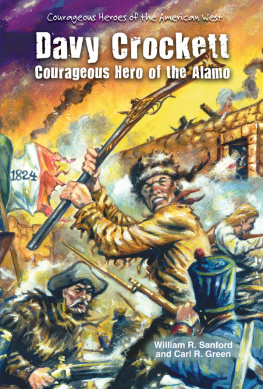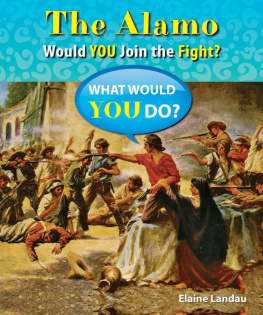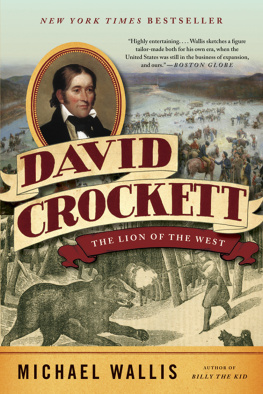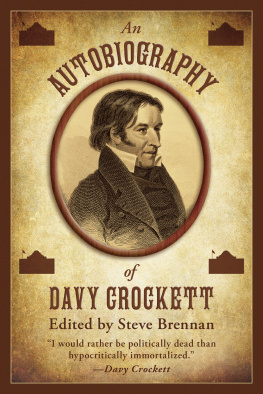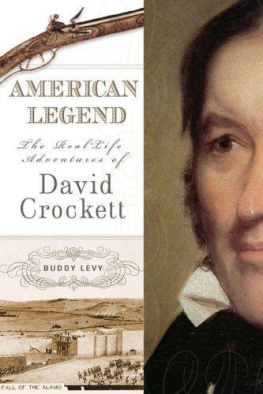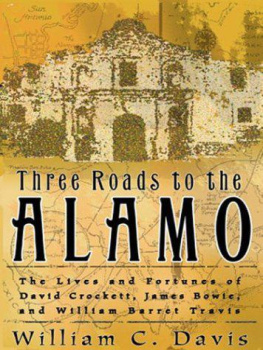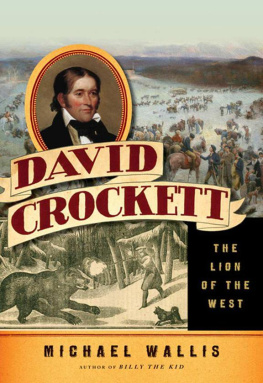2365 Rice Blvd., Suite 202 Houston, Texas 77005
Copyright 2009 by James R. Boylston and Allen J. Wiener.
No part of this book may be reproduced in any form or by any electronic or mechanical means, including information storage and retrieval devices or systems, without prior written permission from the publisher, except that brief passages may be quoted for reviews.
10 9 8 7 6 5 4 3 2 1
Library of Congress Cataloging-in-Publication Data
Boylston, James R., 1954-
David Crockett in Congress: the rise and fall of the poor mans friend /
by James R. Boylston and Allen J. Wiener.
p. cm.
Includes bibliographical references and index.
ISBN 978-1-933979-51-9 (hardcover)
1. Crockett, Davy, 17861836. 2. LegislatorsUnited StatesBiography. 3. United States. Congress. HouseBiography.
4. United StatesPolitics and government18251829. 5. United StatesPolitics and government18291837.
6. TennesseePolitics and governmentTo 1865. 7. Land reformUnited StatesHistory19th century.
I. Wiener, Allen J., 1943- II. Title.
| F436.C95B796 2009 |
| 976.804092dc22 [B] | 2009024431 |
Book and cover design by Marla Garcia and Ellen Cregan
Edited by Tom Kailbourne
Printed in Asia through Asia Pacific Offset
T he authors are indebted to many generous individuals and institutions, who provided immeasurable help in researching and writing this book.
We are very grateful to William C. Davis for giving generously of his time and advice.
We extend our special gratitude and appreciation to our editor, Tom Kailbourn, for his expert workmanship and sound judgment.
Special thanks to Christine Blackerby, archives specialist in the Center for Legislative Archives, U.S. National Archives and Records Administration, for the time she took to provide detailed information on congressional documents and use of the Library of Congresss website, A Century of Lawmaking for a New Nation (http://memory.loc.gov/ammem/amlaw/lawhome.html). Christine also located Crocketts letter to Senator David Barton. Thanks to Kenneth Kato, also an archives specialist in the Center for Legislative Archives, for help in understanding how early nineteenth-century congressional sessions were recorded.
Daniel Feller and Thomas Coens of the Andrew Jackson Papers project, University of Tennessee, Knoxville, gave generously of their time and knowledge.
We appreciate the valuable assistance of the following individuals and institutions: the staff of the Daughters of the Republic of Texas Library at the Alamo; Nathaniel King of the Perkins Library Reference Department, Duke University; Travis Westly, Teri Sierra, and Lia Apodaca at the Library of Congress; Allison DeFriese, Gary Ferguson, and the staff at the Tennessee State Library and Archives; Ann Toplovich, Tennessee Historical Society; William B. Eigelsbach, Special Collections Library, Hoskins Library, University of Tennessee at Knoxville; Tracy Luna, University of Tennessee at Knoxville; Kristi Moffitt of www.gensearch.org; Stephen R. Young and Vida Engstrand, Beinecke Rare Book & Manuscript Library, Yale University; Steven Smith, Historical Society of Pennsylvania; Heather Cole, Leslie A. Morris, Rachel Howarth, and Susan Halpert, Houghton Library, Harvard University; Kimberly Reynolds and Sean Casey, Boston Public Library; David Frasier, Lilly Library, Indiana University; Olga Tsapina and Sue Hodson, Huntington Library; Maurice C. York and Kacy Guill, J. Y. Joyner Library, East Carolina University; Alan Wallace, University of Tennessee Libraries, Knoxville; Geri E. Solomon, Hofstra University; James B. Jones Jr., Tennessee Historical Commission; Ted OReilly, Jody Cary, and Tammy Kiter, New-York Historical Society; Alyson Barrett-Ryan, Gilder Lehrman Collection, New-York Historical Society; Becky W. Livingston, Panhandle-Plains Historical Museum; Brenda McClurkin, Special Collections, University of Texas at Arlington Library; Robin Davies Chen, University Library, University of North Carolina at Chapel Hill; Diana Franzusoff Peterson and John F. Anderies, Haverford College Library; Cynthia M. Van Ness, Buffalo and Erie County Historical Society; Christine De Groot, Archives of American Art, Smithsonian Institution; Mary M. Huth, University of Rochester Library; Declan Kiely and Christine Nelson, Morgan Library and Museum; John D. Tilford, University Archives and Special Collections, Sewanee: The University of the South; Margaret Downs Hrabe and Edward Gaynor, University of Virginia Library; Jennifer B. Lee, Rare Book & Manuscript Library, Columbia University; Jenny Namsiriwan, Maryland Historical Society; Martha Briggs and Alison Hinderliter, Newberry Library; Bryan McDaniel, Chicago History Museum; Elizabeth C. Denlinger and Charles C. Carter, Carl H. Pforzheimer Collection of Shelley and His Circle, New York Public Library; Laura Ruttum, Manuscripts and Archives, New York Public Library.
We are very grateful to Phil Collins; David Zucker; Bruce Gimelson; Todd and Julian Canaday; and Thomas W. Akin of the Arthur Maury Corporation for their generosity in sharing Crockett materials and for their encouragement of this project.
Many thanks to Anne Skilton, Ted Allen Belue, Jeffrey Eger of Auction Catalogues, Bruce McKinney of Americana Exchange, Susan Rabiner, Gary Foreman, William R. Chemerka, Thomas E. Scruggs, Fred Koller,
Mark Michel, Stuart Reid, Bob Durham, Mark Lemon, Herb True, and Ken Sutak.
Finally, we extend our heartfelt thanks to Rue Judd, Lucy Chambers, Ellen Cregan, and the staff of Bright Sky Press.
I n the mythology of America, the legend of Davy Crockett looms large. As a pioneer, Indian fighter, congressman, and martyr of the Alamo, Crocketts remarkable life has been the subject of biographies, novels, comic books, plays, songs, movies, and television shows. The image of the coonskin-capped, buckskin-clad hero swinging his rifle like a Louisville Slugger atop the Alamo is iconic; to most folks, Davy Crockett really is the King of the Wild Frontier.
While Crockett certainly was a pioneer and hardscrabble farmer, a soldier under Andrew Jackson in the Creek War, and a hero who gave his life in the fight for Texas independence, he was also an inveterate entrepreneur and a career politician with a talent for hardball campaigning. More Will Rogers than Daniel Boone, more broadcloth than buckskin, David Crockett began his political career as a justice of the peace and magistrate, and served two terms in the Tennessee State Legislature before being elected to the U.S. House of Representatives for three terms, one of them nonconsecutive. Always popular in his district, Crockett nevertheless was a hard-fighting campaigner, as he faced the formidable political machine of Andrew Jackson in virtually every engagement.


